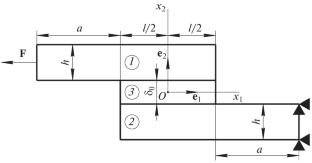论重叠板缝的强度标准
IF 0.6
4区 工程技术
Q4 MECHANICS
引用次数: 0
摘要
根据在给定区域内连接两块板的粘合层破坏的实验数据,以及与设计方案相对应的著名分析解决方案,考虑到静水压力和弹性能量的不变成分,研究了破坏标准的变体。研究了单参数和双参数标准,其中体积和形状的变形能量与层厚度的乘积构成了弹性能量密度的临界流。结果表明,采用与体积变形能准线性相关的双参数准则,薄粘附层的松动最准确地描述了临界状态。本文章由计算机程序翻译,如有差异,请以英文原文为准。

On the Criterion for the Strength of Overlapped Plate Joints
Based on experimental data on the destruction of the adhesive layer that interfaces two plates in a given area, and the well-known analytical solution corresponding to the design scheme, variants of the destruction criterion are considered, taking into account hydrostatic pressure and invariant components of elastic energy. One- and two-parameter criteria are studied, in which the products of the deformation energy of volume and shape and the layer thickness form the critical flow of elastic energy density. It is shown that the loosening of a thin adhesion layer with a two-parameter criterion quasi-linear with respect to the deformation energy of the volume most accurately describes the critical state.
求助全文
通过发布文献求助,成功后即可免费获取论文全文。
去求助
来源期刊

Mechanics of Solids
医学-力学
CiteScore
1.20
自引率
42.90%
发文量
112
审稿时长
6-12 weeks
期刊介绍:
Mechanics of Solids publishes articles in the general areas of dynamics of particles and rigid bodies and the mechanics of deformable solids. The journal has a goal of being a comprehensive record of up-to-the-minute research results. The journal coverage is vibration of discrete and continuous systems; stability and optimization of mechanical systems; automatic control theory; dynamics of multiple body systems; elasticity, viscoelasticity and plasticity; mechanics of composite materials; theory of structures and structural stability; wave propagation and impact of solids; fracture mechanics; micromechanics of solids; mechanics of granular and geological materials; structure-fluid interaction; mechanical behavior of materials; gyroscopes and navigation systems; and nanomechanics. Most of the articles in the journal are theoretical and analytical. They present a blend of basic mechanics theory with analysis of contemporary technological problems.
 求助内容:
求助内容: 应助结果提醒方式:
应助结果提醒方式:


